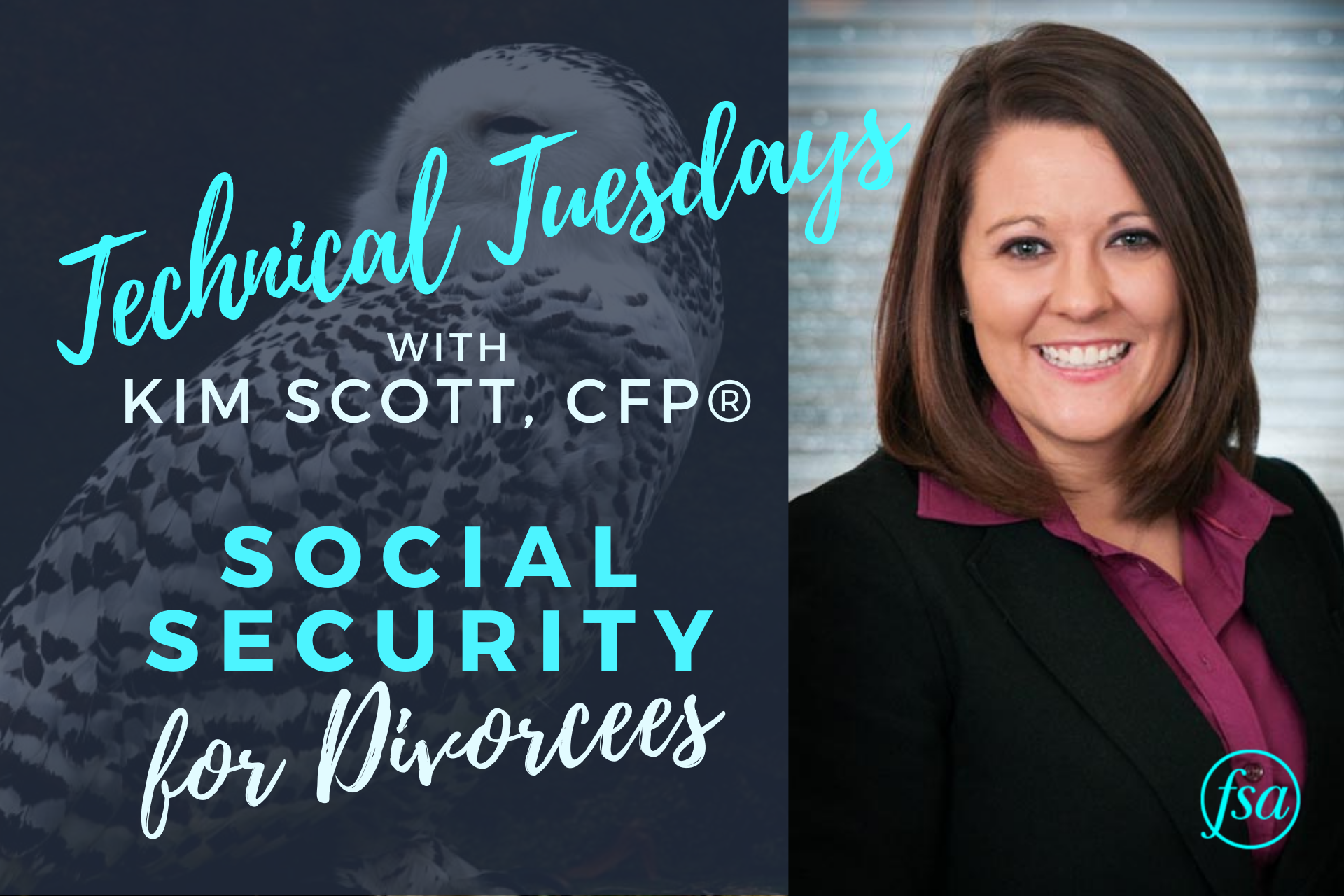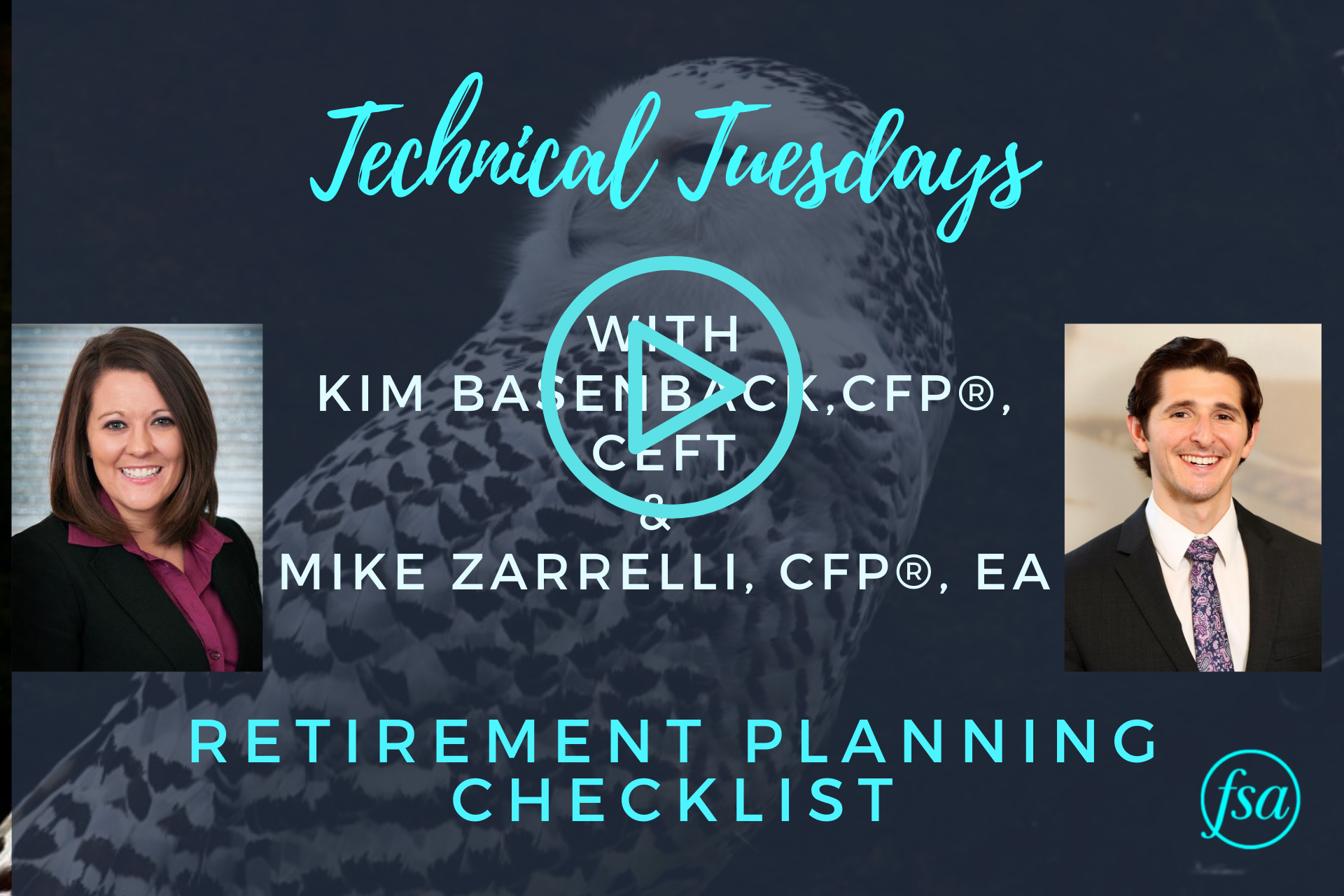In this edition of our Social Security series, Kim Scott provides information on benefits for people who are divorced and shares some strategies.
Social Security for Divorcees Transcript
Hi. Welcome to Technical Tuesday with Financial Services Advisory. My name is Kim Scott, and I’ll be your host today. And today we’re going to talk about Social Security benefits for people that are divorced. Now if you haven’t seen our Social Security Basics video, I would suggest you go and watch that first as that gives you the nuts and bolts of when to file and what it means when you delay. Today we are actually going to talk about specific strategies that are available to people that are divorced. You may actually be eligible for half of your spouse’s benefit if you were married for at least ten years, you have not remarried, you are age 62 or older, and your ex-spouse is actually eligible for either Social Security benefits or disability benefits.
So what are you eligible for? You always have the option of 100% of your benefit or, in this case, potentially 50% of your ex-spouse’s full retirement age benefit. One thing to note is, as we mentioned in our Social Security Basics video, if you wait to file for your benefit beyond your full retirement age, you actually earn delayed retirement credits which means your benefit grows by 8% per year. One thing to note is that the benefit based on your spouse’s record, that 50% I mentioned, that does not increase beyond your full retirement age; it does not receive delayed retirement credits. Now for married couples, they actually have to wait until their spouse files in order to receive a benefit based on their spouse’s record. If you qualify for a benefit based on your ex-spouse’s record, you can file even if they haven’t yet. You just have to have been divorced for at least two years.
For those of you that were born before January 2, 1954, you do actually have some specific scenarios and strategies that are available to you that may not be available to anyone else. For example, you could file based on their benefit and then switch to your own later on. So you may want to contact someone or reach out to us; we’re happy to discuss your specific situation.
Regardless of your age, you will always receive the higher of either your benefit or 50% of your spouse’s benefit that your eligible for.
Now a few things to note for you guys. One, if your spouse has remarried, this does not impact you or their new spouse; you are still eligible for 50% of their benefit, and their spouse may have benefits as well that they’re eligible for, but it does not impact you or them. Also, if your ex-spouse passes away, you may actually be eligible for their full benefit. Also, if your ex-spouse has passed away, you may be eligible for additional benefits. Remember, you do have to have been married for at least ten years. However, if you are caring for a minor child of theirs, you may be eligible even if you weren’t married 10 years. Also, if you get remarried after age 60, the new marriage does not impact your eligibility for benefits.
Okay, let’s talk through time frames. So if you were to file before your full retirement age, you can file as early as age 62, so between that time frame, you are going to take a reduced benefit whether it’s yours or the portion that you’re eligible for on your ex-spouse, and that is reduced for the rest of your lifetime. Then you have your fill retirement age. At that point, you’re eligible for, again, either your full retirement benefit or 50% of your ex-spouse’s benefit. At that point, from full retirement age up until age 70, your benefit grows by 8% per year each year that you wait up until age 70. However, the portion that you are eligible for from your ex-spouse, that does not grow beyond your full retirement age.
So when to file. It really depends on what benefits you’re eligible for at the various ages. So at your full retirement age, what is your benefit that you’re eligible for, what’s half of your ex-spouse’s benefit, and then what would your benefit grow to age 70? So you really want to weigh out what makes sense, and if your ex-spouse’s is significantly higher, it may make sense just to go ahead and take that at full retirement age. If you find yourself in that situation, it’s really worth speaking to someone about it to make sure that they’re looking at your situation and your life expectancy as well as all those specific numbers. Here at FSA, we have a number of tools that we use with clients to walk through their specific situation and map out what that could look like over their lifetime. We are happy to walk through that with you. Feel free to give us a call or email us. For now, I’m Kim Scott, and this has been Technical Tuesday.
FSA’s current written Disclosure Brochure and Privacy Notice discussing our current advisory services and fees is available at www.FSAinvest.com/disclosures or by calling 301-949-7300.




